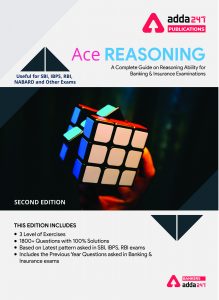Directions (1-4): In the following questions assuming the given statement to be true, find which of the conclusion(s) among given conclusions is/are definitely true and then give your answers accordingly.
Q1. Statements: C > F, A < B ≤ E = G, F ≥ D = A
Conclusions:
I. C ≥ A
II. G > F
(a) Only I is true
(b) Only II is true
(c) Either I or II is true
(d) Neither I nor II is true
(e) Both I and II are true
Q2. Statements: R ≤ S = T, P = Q < R, T > U ≥ V
Conclusions:
I. P < T
II. S > V
(a) Only I is true
(b) Only II is true
(c) Either I or II is true
(d) Neither I nor II is true
(e) Both I and II are true
Q3. Statements: A = K ≥ L, J ≤ I < O, L > P = J
Conclusions:
I. O ≥ L
II. A > J
(a) Only I is true
(b) Only II is true
(c) Either I or II is true
(d) Neither I nor II is true
(e) Both I and II are true
Q4. Statements: R ≥ F > K, D > Q = R, K ≤ M < S
Conclusions:
I. Q > F
II. Q = F
(a) Only I is true
(b) Only II is true
(c) Either I or II is true
(d) Neither I nor II is true
(e) Both I and II are true
Directions (5-8): In the following questions assuming the given statement to be true, find which of the conclusion(s) among given conclusions is/are definitely true and then give your answers accordingly.
Q5. Statements: A = G > N ≥ W, V < B ≤ N, W > S = U
Conclusions:
I. A > B
II. N ≥ U
(a) Only I is true
(b) Only II is true
(c) Either I or II is true
(d) Neither I nor II is true
(e) Both I and II are true
Q6. Statements: S ≥ P = H < G, P < Y ≤ J = X, Y ≥ F = Z
Conclusions:
I. J > S
II. X > Z
(a) Only I is true
(b) Only II is true
(c) Either I or II is true
(d) Neither I nor II is true
(e) Both I and II are true
Q7. Statements: T > Y ≤ U = I > O, E = O > L = K, S = I > X ≤ C
Conclusions:
I. U > K
II. T > S
(a) Only I is true
(b) Only II is true
(c) Either I or II is true
(d) Neither I nor II is true
(e) Both I and II are true
Q8. Statements: O > E ≥ X < B > L, F = W > E ≤ G, S = X > Q
Conclusions:
I. F > O
II. O > Q
(a) Only I is true
(b) Only II is true
(c) Either I or II is true
(d) Neither I nor II is true
(e) Both I and II are true
Directions (9-11): In the following questions assuming the given statement to be true, find which of the conclusion(s) among given conclusions is/are definitely true and then give your answers accordingly.
Q9. Statements: J = E ≥ W = N, M < J ≤ H = Q, M > T = Y ≤ B
Conclusions:
I. Q > Y
II. J = B
(a) Only I is true
(b) Only II is true
(c) Either I or II is true
(d) Neither I nor II is true
(e) Both I and II are true
Q10. Statements: W < F = H > T ≥ O, E = K ≤ O ≤ M, I = C > E
Conclusions:
I. F > E
II. K < I
(a) Only I is true
(b) Only II is true
(c) Either I or II is true
(d) Neither I nor II is true
(e) Both I and II are true
Q11. Statements: U ≥ W ≥ B < N, W = X > S > Q, Y = R ≤ X > I
Conclusions:
I. U > S
II. S ≥ Y
(a) Only I is true
(b) Only II is true
(c) Either I or II is true
(d) Neither I nor II is true
(e) Both I and II are true
Directions (12-15): In the following questions assuming the given statement to be true, find which of the conclusion(s) among given conclusions is/are definitely true and then give your answers accordingly.
Q12. Statements: W ≤ F < G = B, Z ≥ S = M ≥ G, B < L = P, L ≤ S = E < C
Conclusions:
I. F < E
II. S ≤ B
(a) Only I is true
(b) Only II is true
(c) Either I or II is true
(d) Neither I nor II is true
(e) Both I and II are true
Q13. Statements: I > J ≥ M = B, P < S = R ≥ M, V > W = M ≥ C, R > D ≥ N = A
Conclusions:
I. N > W
II. J ≤ D
(a) Only I is true
(b) Only II is true
(c) Either I or II is true
(d) Neither I nor II is true
(e) Both I and II are true
Q14. Statements: O ≥ K ≥ M = W, Z = Q ≤ S ≤ W, V ≥ O = R < P, S = L > D ≥ E
Conclusions:
I. L < R
II. R = S
(a) Only I is true
(b) Only II is true
(c) Either I or II is true
(d) Neither I nor II is true
(e) Both I and II are true
Q15. Statements: K ≤ O = I, P < L = M ≤ K, I > J ≥ N ≥ B
Conclusions:
I. O ≥ L
II. K > J
(a) Only I is true
(b) Only II is true
(c) Either I or II is true
(d) Neither I nor II is true
(e) Both I and II are true
Solutions
S1. Ans. (d)
Sol.
I. C ≥ A – False
II. G > F –False
S2. Ans. (e)
Sol.
I. P < T – True
II. S > V -True
S3. Ans. (b)
Sol.
I. O ≥ L – False
II. A > J – True
S4. Ans. (c)
Sol.
I. Q > F – False
II. Q = F– False
S5. Ans. (a)
Sol.
I. A > B – True
II. N ≥ U – False
S6. Ans. (d)
Sol.
I. J > S – False
II. X > Z– False
S7. Ans. (a)
Sol.
I. U > K – True
II. T > S – False
S8. Ans. (b)
Sol.
I. F > O – False
II. O > Q – True
S9. Ans. (a)
Sol.
I. Q > Y – True
II. J = B – False
S10. Ans. (e)
Sol.
I. F > E – True
II. K < I – True
S11. Ans. (a)
Sol.
I. U > S – True
II. S ≥ Y – False
S12. Ans. (a)
Sol.
I. F < E – True
II. S ≤ B – False
S13. Ans. (d)
Sol.
I. N > W – False
II. J ≤ D – False
S14. Ans. (c)
Sol.
I. L < R – False
II. R = S – False
S15. Ans. (a)
Sol.
I. O ≥ L – True
II. K > J – False





 GA Capsule for SBI Clerk Mains 2025, Dow...
GA Capsule for SBI Clerk Mains 2025, Dow...
 The Hindu Review October 2022: Download ...
The Hindu Review October 2022: Download ...
 IBPS PO Syllabus 2025 and Exam Pattern f...
IBPS PO Syllabus 2025 and Exam Pattern f...







